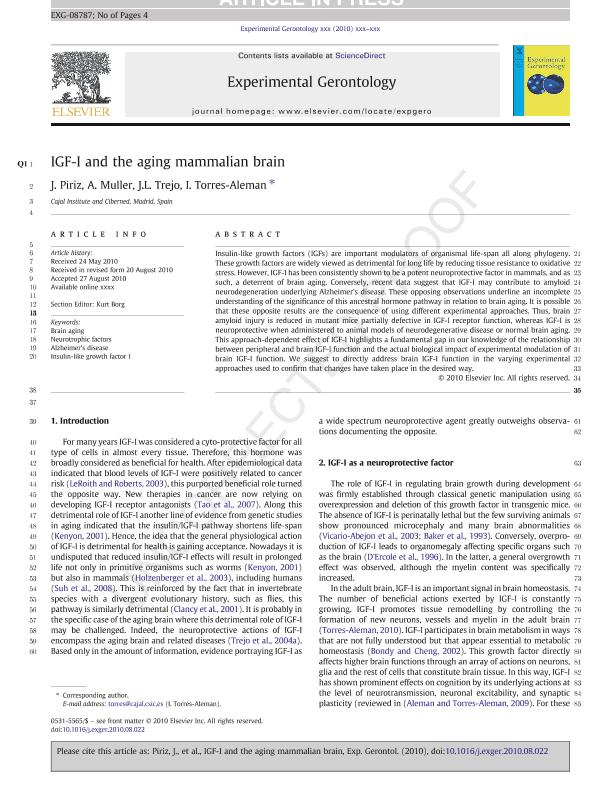Mostrar el registro sencillo del ítem
dc.contributor.author
Piriz, Joaquin

dc.contributor.author
Muller, A.
dc.contributor.author
Trejo, J. L.
dc.contributor.author
Torres Aleman, I.
dc.date.available
2017-07-12T20:33:35Z
dc.date.issued
2010-09
dc.identifier.citation
Piriz, Joaquin; Muller, A.; Trejo, J. L.; Torres Aleman, I.; IGF-I and the aging mammalian brain
; Elsevier Inc; Experimental Gerontology; 46; 2-3; 9-2010; 96-99
dc.identifier.issn
0531-5565
dc.identifier.uri
http://hdl.handle.net/11336/20274
dc.description.abstract
Insulin-like growth factors (IGFs) are important modulators of organismal life-span all along phylogeny. These growth factors are widely viewed as detrimental for long life by reducing tissue resistance to oxidative stress. However, IGF-I has been consistently shown to be a potent neuroprotective factor in mammals, and as such, a deterrent of brain aging. Conversely, recent data suggest that IGF-I may contribute to amyloid neurodegeneration underlying Alzheimer's disease. These opposing observations underline an incomplete understanding of the significance of this ancestral hormone pathway in relation to brain aging. It is possible that these opposite results are the consequence of using different experimental approaches. Thus, brain amyloid injury is reduced in mutant mice partially defective in IGF-I receptor function, whereas IGF-I is neuroprotective when administered to animal models of neurodegenerative disease or normal brain aging. This approach-dependent effect of IGF-I highlights a fundamental gap in our knowledge of the relationship between peripheral and brain IGF-I function and the actual biological impact of experimental modulation of brain IGF-I function. We suggest to directly address brain IGF-I function in the varying experimental approaches used to confirm that changes have taken place in the desired way.
dc.format
application/pdf
dc.language.iso
eng
dc.publisher
Elsevier Inc

dc.rights
info:eu-repo/semantics/openAccess
dc.rights.uri
https://creativecommons.org/licenses/by-nc-nd/2.5/ar/
dc.subject
Brain Aging
dc.subject
Neurotrophic Factors
dc.subject
Alzheimer'S Disease
dc.subject
Insulin-Like Growth Factor I
dc.subject.classification
Neurociencias

dc.subject.classification
Medicina Básica

dc.subject.classification
CIENCIAS MÉDICAS Y DE LA SALUD

dc.title
IGF-I and the aging mammalian brain
dc.type
info:eu-repo/semantics/article
dc.type
info:ar-repo/semantics/artículo
dc.type
info:eu-repo/semantics/publishedVersion
dc.date.updated
2017-07-12T14:52:50Z
dc.journal.volume
46
dc.journal.number
2-3
dc.journal.pagination
96-99
dc.journal.pais
Estados Unidos

dc.description.fil
Fil: Piriz, Joaquin. Instituto Cajal; España. Consejo Nacional de Investigaciones Científicas y Técnicas; Argentina
dc.description.fil
Fil: Muller, A.. Instituto Cajal; España
dc.description.fil
Fil: Trejo, J. L.. Instituto Cajal; España
dc.description.fil
Fil: Torres Aleman, I.. Instituto Cajal; España
dc.journal.title
Experimental Gerontology

dc.relation.alternativeid
info:eu-repo/semantics/altIdentifier/doi/http://dx.doi.org/10.1016/j.exger.2010.08.022
dc.relation.alternativeid
info:eu-repo/semantics/altIdentifier/url/http://www.sciencedirect.com/science/article/pii/S0531556510002664
Archivos asociados
